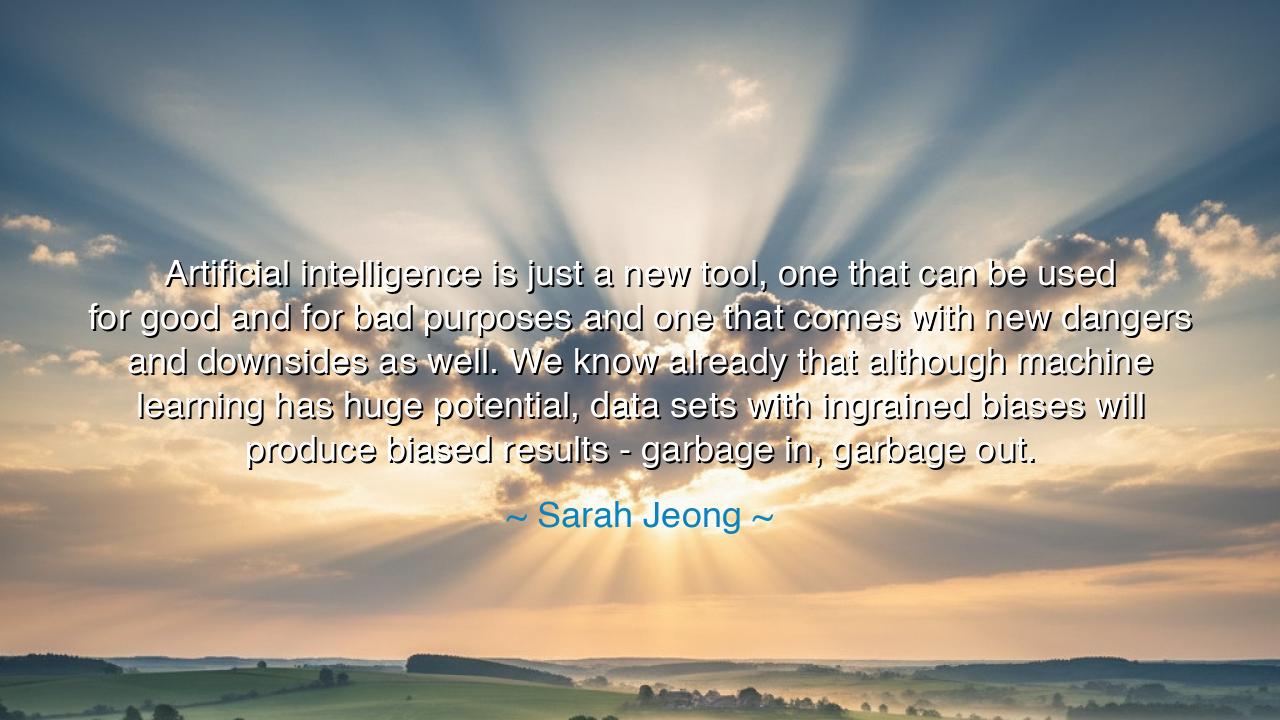
Artificial intelligence is just a new tool, one that can be used
Artificial intelligence is just a new tool, one that can be used for good and for bad purposes and one that comes with new dangers and downsides as well. We know already that although machine learning has huge potential, data sets with ingrained biases will produce biased results - garbage in, garbage out.






In the discerning and cautionary words of Sarah Jeong, writer, legal scholar, and chronicler of the digital age, we are given a truth both modern and eternal: “Artificial intelligence is just a new tool, one that can be used for good and for bad purposes and one that comes with new dangers and downsides as well. We know already that although machine learning has huge potential, data sets with ingrained biases will produce biased results — garbage in, garbage out.” These words are not spoken in fear of progress, but in defense of wisdom. They remind us that every invention, however wondrous, carries within it the reflection of its creator — for all that man builds is but an echo of his own heart and mind.
The origin of this quote lies in Jeong’s reflections on the ethics of artificial intelligence and the challenges of a world increasingly governed by algorithms. A scholar of law and technology, she has long studied how digital systems shape power and perception. Her words arose from the growing awareness that machine learning, for all its promise, inherits the flaws of its makers. AI does not see the world with divine objectivity; it sees through the lens of the data we feed it. And that data, drawn from human history, is stained with the biases, injustices, and inequalities that have haunted humanity for centuries. Thus, when Jeong warns of “garbage in, garbage out,” she speaks not only of technical error but of moral blindness.
To call artificial intelligence a tool is to place it in the long lineage of mankind’s inventions — the wheel, the plow, the printing press, the engine, the atom. Each, in its time, expanded the power of human hands and minds. Yet, as Jeong reminds us, every tool is double-edged. The printing press spread enlightenment but also propaganda. The atom yielded light and destruction. The internet birthed knowledge and deception in equal measure. So too does AI stand upon this precipice: it can heal or harm, illuminate or deceive, depending on the will that wields it. The danger lies not in the tool, but in the heart that guides it.
Consider the story of Oppenheimer, father of the atomic bomb. When he first split the atom, he unlocked forces greater than myth, believing that scientific progress alone was a moral good. But when that power turned cities to ash, he stood before his creation and recalled the ancient words of the Bhagavad Gita: “Now I am become Death, the destroyer of worlds.” His story mirrors Jeong’s warning — that knowledge without conscience leads to devastation. Today, the creators of AI stand in a similar place. They, too, have summoned a power capable of reshaping civilization, yet they must ask themselves: what vision of humanity will it serve?
When Jeong speaks of bias in data, she touches a wound older than technology itself — the inability of mankind to see all with equal fairness. A machine learns from the past, and if the past is unjust, the machine will learn injustice. If our data excludes the poor, the marginalized, the forgotten, then the algorithms will perpetuate their silence. The danger is not merely mechanical; it is moral. Just as a mirror reflects the face before it, AI reflects the society that built it. Thus, the great question of our age is not whether machines can think, but whether we can think rightly about the machines we create.
Yet there is hope in Jeong’s vision. For to call AI a tool is also to affirm our agency. The tool does not command the hand; the hand commands the tool. Humanity need not fear the rise of machines, but rather its own complacency. If we approach this new age with humility and wisdom, AI can become a force for understanding, curing disease, connecting minds, and extending compassion. But if we approach it with greed or arrogance, it will magnify our worst impulses — prejudice, inequality, control. The choice, as it has always been, rests with us.
Therefore, O seeker of balance, heed this wisdom: treat technology as a servant of virtue, not a substitute for it. Feed your machines not only with data, but with discernment. Let your pursuit of innovation be guided by justice, empathy, and humility. Examine what you place into your creations — for what goes in will, in time, come out multiplied. The ancients forged swords; we forge code. Yet the question remains unchanged: will we build tools of harmony or instruments of ruin?
And so, as Sarah Jeong teaches, the future of artificial intelligence is not in the hands of the machines — it is in the hearts of those who make them. The tool itself is innocent; the maker alone bears the weight of its purpose. Remember always: when knowledge grows faster than wisdom, even light may cast a dangerous shadow. But when intellect walks beside conscience, every tool — even one made of silicon and code — can serve the eternal good, and help humanity ascend, not fall, in its quest for understanding.






AAdministratorAdministrator
Welcome, honored guests. Please leave a comment, we will respond soon